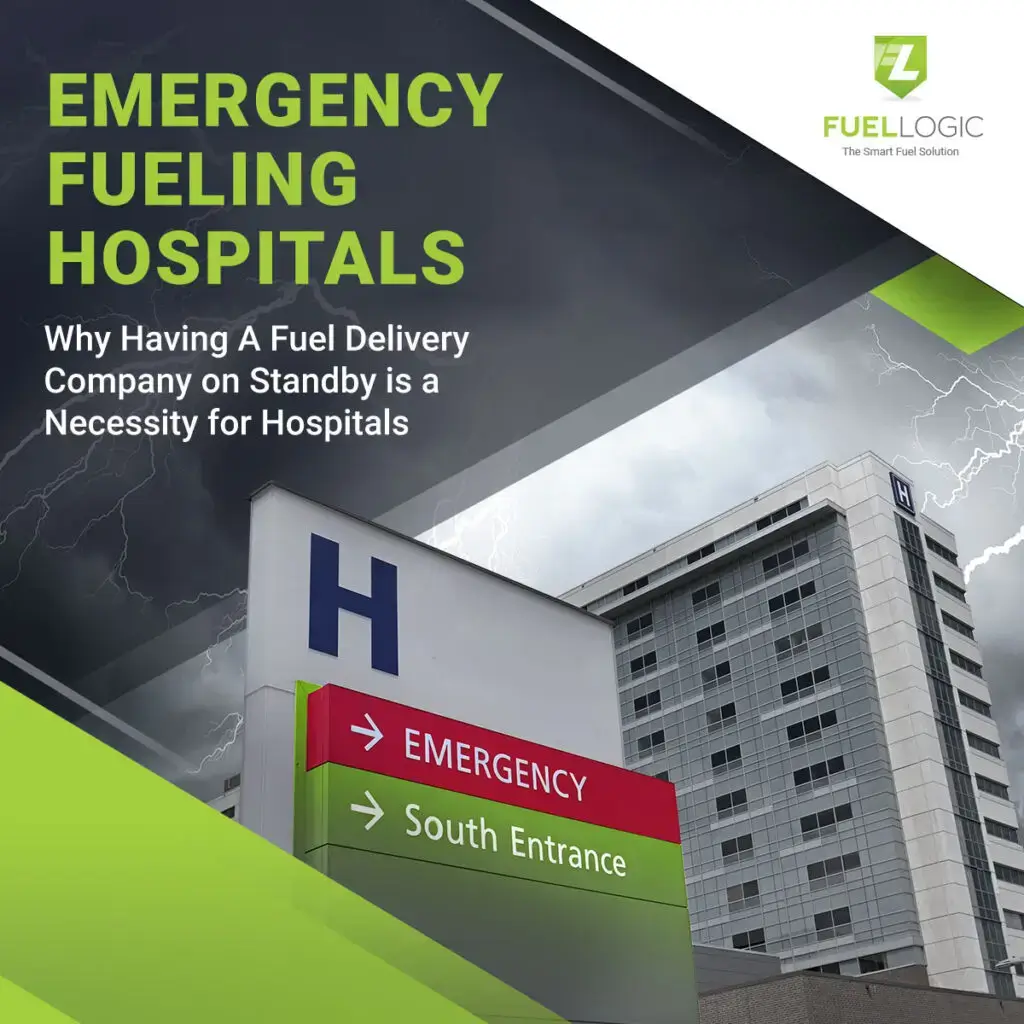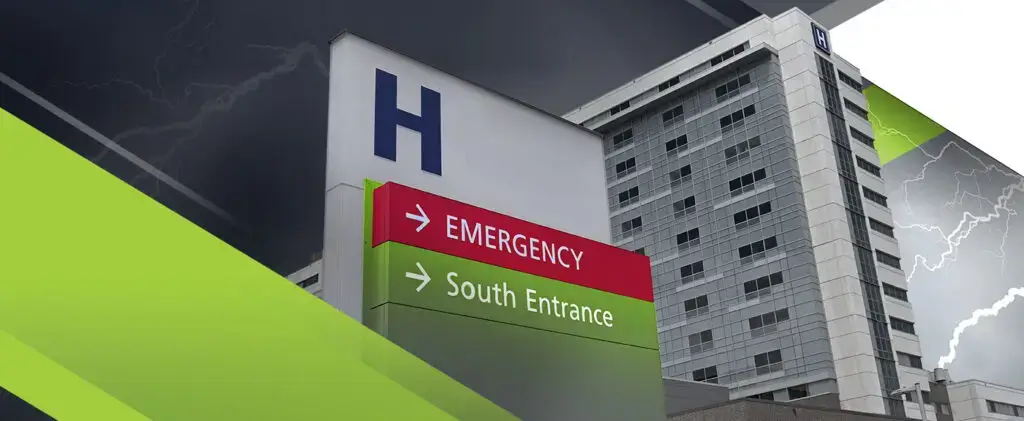Without warning, hospitals and other healthcare facilities can be hit by power outages caused by natural calamities or human actions. In situations where the lives of both patients and employees are at stake, every moment counts.
During such challenging times, generator fuel reserves become a resource for operating life-sustaining medical devices and equipment that are essential for the well-being of patients and staff. Apart from affecting the building’s power supply, fuel shortages can also interrupt the transportation of doctors, staff, and ambulances, as well as air medical operations.
This article will explore the importance of having an emergency fuel supplier on hand and the potential consequences of downtime.
TABLE OF CONTENTS
Why Having an Emergency Fuel Supply on Standby is a Necessity for Hospitals?

Having access to a fuel service is essential for several reasons:
Power Outages
Hospitals require a ceaselessly constant and reliable source of electricity to operate medical equipment and provide essential services to patients. In a power outage, a standby generator can provide backup power. However, these generators require fuel to operate, and if the reserves run out, it can cause critical equipment to stop working.
Take an example of the widespread blackout of 2003 in the northeastern United States and Canada. This horrendous incident left over 45 million people across the states without electricity. More than 75 clinics were without power, lasting more than two hours.
In such situations, a generator refueling service guarantees that the hospital can access the necessary fuel to keep the emergency generator running. It provides the service of refueling generators with the required fuel, typically gasoline or diesel, so that they can continue to run uninterrupted.
Natural Disasters
Natural disasters such as hurricanes, storms, tornadoes, and earthquakes can cause significant damage to a hospital’s infrastructure and disrupt power.
Take the example of the Florida Hurricanes in 2005. Emergency services warned that hundreds of hospitals and nursing homes were at a high risk of flooding, which could cause a significant disruption in healthcare services.
When nationwide emergency fuel delivery companies are readily available, they can provide fuel even if their local supply chain collapses due to natural disasters.
Increased Demand
Hospitals must be prepared to deal with a sudden influx of patients during a crisis like a pandemic or mass casualty event. It can strain the hospital’s resources, including its fuel supply. In a prolonged situation, the hospital may need additional fuel to keep its generators running or to power medical equipment.
An on-call fuel delivery company can help ensure that the hospital has access to the necessary fuel to meet this increased demand. It can provide regular fuel deliveries to the hospital to keep its generators and other essential equipment running.
The availability of a fuel delivery company can provide peace of mind to hospital administrators and staff, knowing that they have a reliable and sufficient fuel source in an emergency. It can also help to maintain normal operations and provide critical care to patients during a crisis.
Time Constraints
In emergencies, time management is crucial. Access to fuel services can help certify that the hospital has access to fuel quickly, without the need for time-consuming and potentially dangerous fuel transportation by hospital staff. With the help of emergency fuel delivery, precious time will be spent on patients rather than waiting for fuel.
Having a fuel delivery company on standby is crucial for emergency fueling hospitals to ensure they have access to the necessary fuel to keep their backup power systems running in times of crisis. It provides a reliable and timely source of energy that can help hospitals meet increased demand, overcome limited storage capacity, and avoid interruptions to critical medical services.
Consequences of Downtime in Hospitals – Why Emergency Fuel Delivery Is A MUST
The consequences of downtime in a hospital can be severe and potentially life-threatening for patients. Hospitals rely on a wide range of critical systems and equipment to provide care, and any interruption or failure of these systems can have a significant impact.
Productivity Will be Minimized
The absence of necessary services can cause a lack of productivity. A power outage can affect the operation of life support systems, diagnostic equipment, and other vital systems. It can result in delayed or interrupted treatments, critical data loss, and reduced patient safety.
Nurses might need to spend extra time manually recording patient data or organizing care, for instance, which can cause delays in treatment and release. Some equipment, such as ventilators, may not function properly without power, putting patients at risk. Such a situation makes cooking impossible in the cafeterias and refrigeration of food.
Patient Care Can be Interrupted
Another system that can be impacted during downtime is the communication system. Hospitals use communication systems to coordinate care, update patient conditions, and alert staff in emergencies. Patient care can be delayed or compromised without a functioning communication system, leading to adverse health outcomes.
Downtime can also impact the hospital’s electronic health record (EHR) system, which stores patient information and medical histories. Interruptions or loss of access to this system can make it difficult for medical staff to provide the appropriate care or make informed decisions about treatment plans.
Patient Safety May be Endangered
Downtime can compromise patient safety if critical systems, such as medical equipment, are affected. For example, if a hospital’s electronic medication administration system is down, medication errors may occur, or incorrect dosages may be given to patients.
Overall, downtime in a hospital can cause delays in patient care, increased risk of medical errors, and compromised patient safety. In emergencies, the consequences can be even more severe, making hospitals need robust emergency fuel delivery systems for the uninterrupted operation of critical systems and equipment.
Contact Us To Prepare Your Diesel Fuel Plan
There is no need to waste your valuable time if you need fuel when a superior alternative is available. Fuel logic is near you, across the 48 lower United States. We’re ready to provide emergency fuel delivery to keep your business operating.
All you need to do is fill out a form or talk to one of our agents. Delivering fuel without any hitch is our specialty.
So, whether you are administering a hospital, small clinic, or health care center, contact our agent. Our truck will be sent at your chosen time any day. We can also set a personalized schedule for your convenience.
We offer a straightforward and convenient Mobile Fuel for fleets, DEF, Gas, and Diesel.
You can also rely on our on-site fuel service; contact us to schedule your diesel fuel delivery services today.
Contact us today to begin your journey with us!

